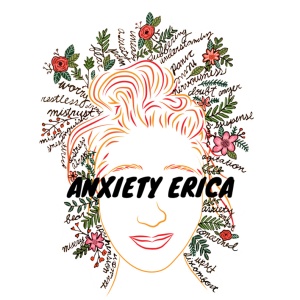In a very first for the blog, we discuss mental health surrounding addiction. Clean and sober for 11 years, Alicia went to rock bottom and back on her journey towards finding purpose, hope, and self love.
Abundant in light and compassion, she carries the mantra, “This too shall pass,” to get her through the worse bouts of emotion and anxiety. A truly genuine and beautiful soul, I’m proud to know Alicia – both through this blog and in my personal life.
Meet Alicia.

Name: Alicia
Age: 43
Explain the origin of your mental health issues i.e., what is your mental health issue, how did you realize what was happening, how was it affecting your everyday life at the time?
After 11 years of being clean and sober, I am comfortable admitting that I am a recovering alcoholic and addict. Scientific studies have concluded that addiction is a form of mental illness and sometimes is precipitated by self-medicating for another form of mental illness. I drank and used drugs to get a break from depression and from feeling out of control. I needed to feel more confident around others and more at ease when anxiety was high. I came to learn after I opened up about my struggles that members of my family have been diagnosed and painfully lived through various forms of mental illness. So, it is in my DNA.
When I look back at my childhood I see the same dysfunctional mental patterns that I came to recognize as an adult. Through the years, I’ve heard several times that addiction and substance abuse can stunt emotional growth. This is very true for me. It’s only in my 30’s that I learned to actually feel my feelings without a mask no matter how painful or joyous they may be. From the age of 10 I snuck alcohol at family parties, and by 13 I was drinking alone. As many high school and college kids do, friends and I had our share of experimenting with different drugs. In my 20’s I started using when my friends weren’t around, which eventually brought me to my rock bottom.
What was the resounding moment when you decided to get help? What made you do it?
I was born and raised on Long Island where my family and closest friends have remained. In 2006, I was living in Colorado far from those who knew me best. They got glimpses of how my life was crumbling apart by my 2 am phone calls fueled by drug-induced paranoia and fear while in desperate need for love. If my call went unanswered during sleeping hours I would get a concerned call back the next day. Whether I was feeling fine at that moment or coming down from a drug binge, I ignored those calls. I was selfish, only accepting love on my time and not giving any in return. As I look back, it’s apparent that I had no idea what love was, considering I had zero love for myself. I put myself in plenty of unsafe situations without any concern about detrimental consequences. Life was meaningless. Without actually my saying the words, my two closest friends and parents read between the lines and knew I was subconsciously, desperately calling out for help.
Because I couldn’t help myself, they made the first step. Without my knowledge, my parents and two closest friends back in New York contacted my Colorado-based psychiatrist and together researched various treatment facilities that could best heal my struggling mind. After they agreed on the best setting for me, I was presented with the opportunity to get the help I needed. Resistant to the idea at first because I was concerned about leaving my dog, my job and my comfort zone, I gave in when my dear friend Niki said, “I can’t support your unhappiness any more, I can only support your love and healing.”
In the days following, April 30, 2006, I flew from Colorado to a renowned in-patient addiction and trauma center in Arizona. I dedicated a month sequestered to 8-hour days of group and one-on-one therapy with others who walked many different paths of mental illness. A week was dedicated to inviting family members to attend in the healing process. I of course invited my Mom and Dad who flew in from New York. As the 30-days came to a close at this rehab center, it was apparent to the staff that this was just a stepping- stone to my recovery. Although I abstained from drinking and using during this time, I had not admitted that I had a problem with drugs and alcohol.
Again, I gave in to going to another treatment center. Still selfish, I said I would go with one condition — if I could bring my dog Bailey. Low and behold, the doctors found an all-women residential addiction treatment center in Costa Mesa, California, where my fur baby was welcomed. I was discouraged from flying back to Colorado so took a one-way flight from Arizona to California for my next attempt at self-love. My dog Bailey was delivered directly to the doorstep of my treatment home by none other than my parents. They flew from New York to Colorado to pick her up and collect my summer wardrobe, and then drove my car to California.
I spent the next four months living in a house with women from the ages of 18-20-something with the exception of myself — age 31 at the time –and another woman who was 62. Each had also come from various treatment centers from around the country, but we all shared a similar story. Together in the house we had group and one-on-one therapy with addiction specialists, and under close supervision, we also attended 12-step meetings in the neighborhood. By listening to women who shared their experience, strength and hope of recovery from alcoholism and addiction, I too came to believe that I was an alcoholic and addict, and there was hope for happiness.
How does it affect your everyday life now? Challenges? What skills have you learned to cope?
Thankfully, I have not picked up a drink or drug since that flight to Arizona on April 30, 2006. I’ve learned that all emotions — sad, scared, happy and everything in between — are necessary to live a healthy and productive life. The thing about feelings that keeps me in check is that they all pass, that’s the beauty of being human. I am empowered knowing that I am completely dependent on myself for the way I perceive the world around me. I have control over how to handle people and situations by simply accepting the way I feel. Sometimes when it’s a crappy emotion I simply say “I’m depressed and I love that!” Owning the emotion makes it less intimidating and reminds me that it won’t last forever. And when I’m struggling with any one feeling that may trigger irrational or overwhelming thoughts, I reach out to those few that I trust most to bring me back to reality and, better yet, share a laugh about it. The beauty of today is that I’m able to be present with friends and family who need the same love and understanding in return.
Another form of self-awareness that has helped quiet my mind and keeps me in the moment is exercising. I never listen to music when I run, hike or lift weights. I simply pay attention to my breath and focus on one motion at a time. The more I push myself to my physical limits, the more grounded I feel. The sense of accomplishment by the end of a workout boosts my mood. That’s what keeps me coming back for more.
How has living with this mental illness benefited your life? What has it given you?
Self-love. I have a visual reminder of this, a vanity license plate that reads SELF(heart)19. Nineteen is a lucky number that I share with the two friends that started me on this journey of self-love. Seeing this everyday reminds me that having courage, strength and hope will get me through anything, and in turn I’ll be able to give abundantly to my friends, family and community. It also keeps me accountable considering it’s often been a topic of conversation in parking lots. I’ve spent my sober years living in southern California and when I open up to those I’ve met along the way, the response is usually the same, “I can’t imagine you unhappy,” which is humbling.
What is one piece of advice you would give yourself when you were struggling the most with your mental illness?
“This too shall pass,” is something I tell myself when I feel overwhelmed or out of control with any emotion. I’ll never be “recovered” from alcohol and drugs but I will always be “in recovery” because it’s a life-long practice and discipline. Therefore what may have helped me in the past may have evolved to something different today. My self-love is constantly evolving whether it’s in the form of meeting new friends, doing a different form of exercise, immersing myself in the community or picking up a new hobby. Life certainly never gets boring but rather more fulfilling because of where I came from and where I’m at now. I love that mental illness is part of my story because I’m constantly learning how to pick myself up and enjoy a life that I never thought possible.
Are you a work in progress? Share your story in the comments below and you may be featured on the blog!


A very courageous and beautiful story of finding strength within and allowing loved ones to support and guide you. Well done.
LikeLiked by 1 person
Thank you for the wonderful comment, Alfred! I agree, Alicia’s story is powerful and I’m so glad she shared it – it will heal others.
LikeLike